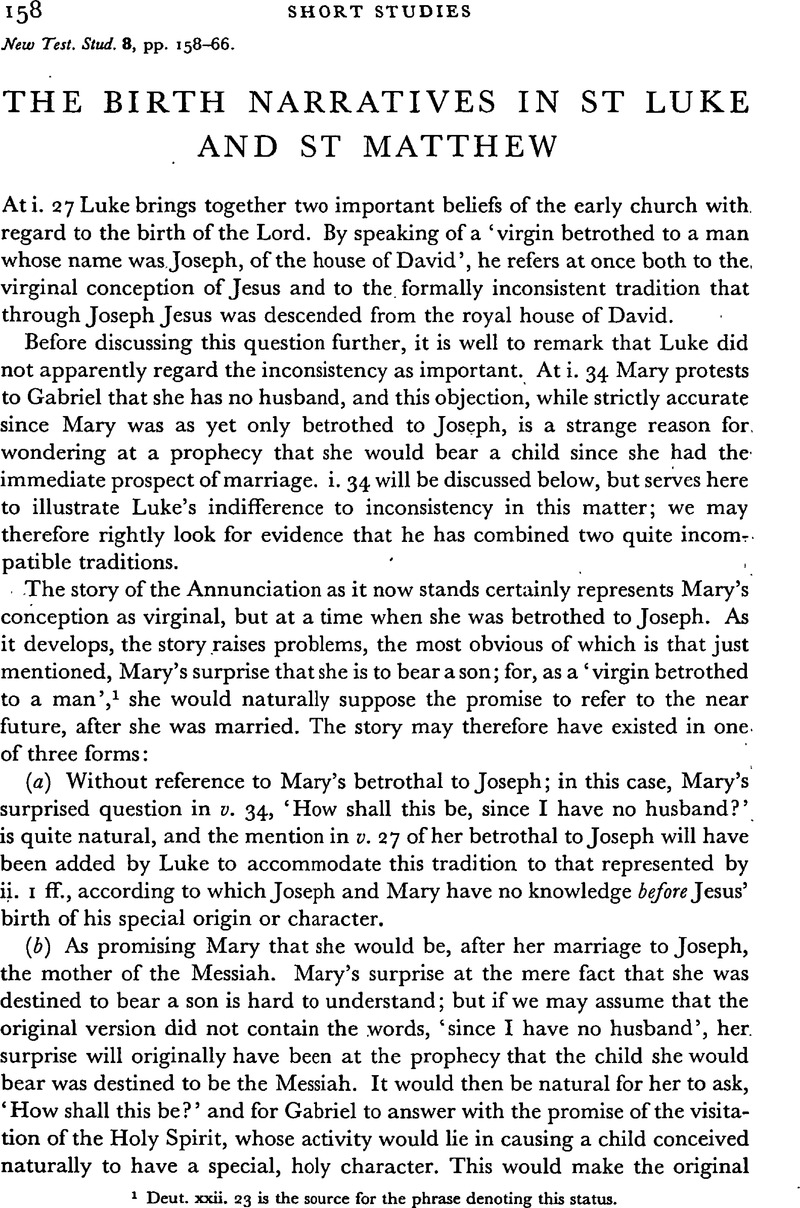No CrossRef data available.
Published online by Cambridge University Press: 05 February 2009

page 158 note 1 Deut. xxii. 23 is the source for the phrase denoting this status.
page 159 note 1 The Old Latin Codex b omits the words, reading ‘ecce ancilla domini contingat mihi secundum verbum tuum’ (‘Behold the handmaid of the Lord. May it happen to me according to thy word’), —and omits these words at v. 38, reading there only ‘et discessit ab illa angelus’ (‘and the angel departed from her’). In this variant form of v. 38 b is followed by e. But these variants may well be due to ‘parablepsis’, i.e. a wandering of the scribe's eye from one point in his exemplar to another where the words were similar. This explanation has been very plausibly suggested for this case by White, H. J. in J.T.S. XV, 600–2. The scribe of Codex Veronensis (b) allowed his eye to wander from the first to the third column of a page of fifteen lines and four columns, for both v. 34, at the head of the first column, and v. 38, at the head of the third, begin with the words, ‘Dixit autem Maria…’ Apart from manuscript evidence, some slight support for omitting ‘since I have no husband’ is found in the fact that έπεί does not occur elsewhere in Luke.Google Scholar
page 159 note 2 Cf. John iv. 18, where the true interpretation may be that Samaria's five husbands are the gods of the nations of II Kings xvii. 24–34, and Yahweh is not Samaria's true husband (Ezra, Cf. iv. 2–3).Google Scholar
page 159 note 3 Cf., Isa. lii. 1–2;Google Scholar lxvi. 7; Micah, iv. 8;Google ScholarJer, . iv. 31; vi. 23; viii. 19–22; xxx. 21–2;Google ScholarLam, . ii. 13, 18; iv. 21–2;Google ScholarZeph, . iii. 14–20;Google ScholarZech, . ii. 10; ix. 9;Google ScholarJoel, . ii. 21.Google Scholar
page 160 note 1 II Esdras ix. 38-x. 57. See Hebert, A. G. (on the basis of an article by Sahlin)in Theology, LIII (11 1950), 403.CrossRefGoogle Scholar
page 160 note 2 It is not surprising that for Mαριαμ at i. 46 ab 1* Iren. 235 Or read ‘λισαβεΤ although these fathers are not consistent, for Iren. 185 reads Maria. (Burkitt believed Helisabeth was original also in 185 (J.T.S. VII, 220).) These facts have led some commentators to conclude that no name was originally provided, the text reading simply και είπεαριαμ (where no noun is needed) in v. 56 suppports the view that the Magnificat is not in its original position. Nevertheless, the testimony of the majority of the codices to the reading Mαριαμ cannot lightly be passed over, and it is likely that this is what Luke wrote, the variant ‘EλισαβεΤ being due to the context.Google Scholar
page 161 note 1 Cf., Luke iv. 24; vii. 16, 39; ix. 8, 19 xiii. 33; xxiv. 19.Google ScholarThe Lord is himself the speaker in iv. 24 and xiii. 33. vii. 16, vii. 39, xiii. 33 and xxiv. 19 all occur in the material peculiar to the gospel.Google Scholar
page 161 note 2 Nazara is perhaps the Q form since it occurs also at Matt, . iv. 13.Google Scholar
page 164 note 1 Both Syr. Sin, and Cur, add ‘to thee’ after ‘shall bear a son’ in v. 21 but this is a natural Syriac idiom and probably without significance.
page 164 note 2 According to Jos., Ant. IV, 8Google Scholar he ought to put away his betrothed; according to Deut, . xxii. 23 f. she is liable to stoning.Google Scholar
page 165 note 1 1, 26, 28, 29, 33, 34, 35, 37, 38; II, 7.
page 165 note 2 Cf., John viii. 41–2.Google Scholar